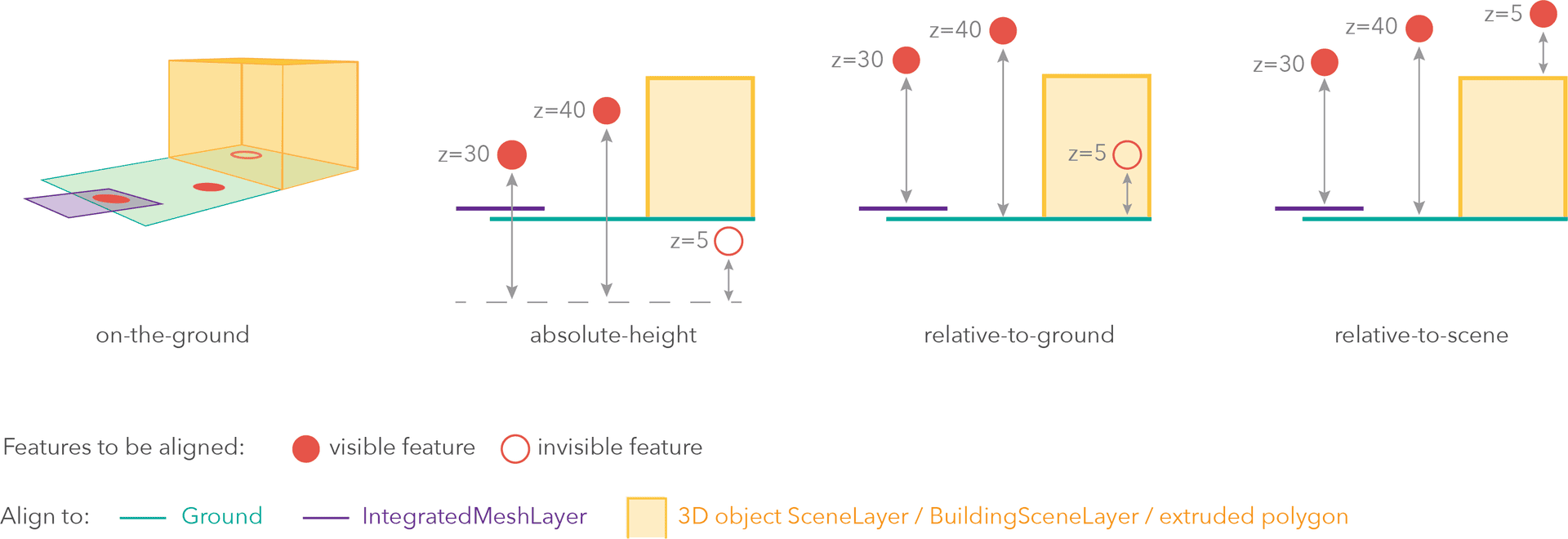require(["esri/analysis/LineOfSightAnalysisObserver"], (LineOfSightAnalysisObserver) => { /* code goes here */ });
import LineOfSightAnalysisObserver from "@arcgis/core/analysis/LineOfSightAnalysisObserver.js";
esri/analysis/LineOfSightAnalysisObserver
The LineOfSightAnalysisObserver represents an observer of a LineOfSightAnalysis.
Use the position property to specify the position of the observer.
Constructors
-
Parameterproperties Objectoptional
See the properties for a list of all the properties that may be passed into the constructor.
Property Overview
| Name | Type | Summary | Class |
|---|---|---|---|
The name of the class. | Accessor | ||
Specifies how the observer is placed on the vertical axis (z). | LineOfSightAnalysisObserver | ||
References a feature which is excluded from the intersection testing. | LineOfSightAnalysisObserver | ||
A Point representing the position of the observer. | LineOfSightAnalysisObserver |
Property Details
-
Specifies how the observer is placed on the vertical axis (z). See the ElevationInfo sample for an example of how this property may be used.
If the elevation info is not specified, the effective elevation depends on the position properties of the observer.
- Properties
-
mode String
Defines how the observer is placed with respect to the terrain surface or 3D objects in the scene. See the table below for a list of possible values.

Mode Description on-the-ground Observer is aligned to the Ground. If the scene contains an IntegratedMeshLayer or IntegratedMesh3DTilesLayer, then the observer is aligned to the IntegratedMeshLayer or IntegratedMesh3DTilesLayer. If that observer has a z-value, then the z-value is ignored in this mode. This is the default value when hasZ on position is false.absolute-height Observer is placed at an absolute elevation (z-value) above sea level. This z-value is determined by the observer's z-value (if present). This mode doesn't take the elevation of the Ground or any other layers into account. This is the default value when hasZ on position is true.relative-to-ground Observer is placed at an elevation relative to the Ground or IntegratedMeshLayer or IntegratedMesh3DTilesLayer. The elevation is determined by summing up the elevation of the Ground or IntegratedMeshLayer or IntegratedMesh3DTilesLayer and the geometry's z-value (if present). relative-to-scene Observer is aligned to extruded polygons, meshes, 3D Object SceneLayers or BuildingSceneLayers, depending on which one has higher elevation. If the observer is not directly above a building or any other feature, it is aligned to the elevation of the Ground or the IntegratedMeshLayer or IntegratedMesh3DTilesLayer. If present, the observer's z-value is added to the elevation. Possible Values:"on-the-ground"|"relative-to-ground"|"absolute-height"|"relative-to-scene"
An elevation offset, which is added to the vertical position of the observer. If
unitis not defined, the offset is inmeters. Whenmode = "on-the-ground", this property has no effect.
-
feature
Propertyfeature FeatureReference |null |undefined -
References a feature which is excluded from the intersection testing. It is used to ensure that the analysis results remain independent of changes in the level of detail (LOD) of this feature's geometry.
When creating or editing the observer interactively, this property is populated automatically.
Note that you can assign client side graphics which will be taken into account accordingly. However, information about client side graphic will not be persisted and results in an empty reference after de-serialization.
-
A Point representing the position of the observer. Once the position is set, a new line of sight analysis will synchronously calculate the intersection and the visibility to each target of the associated LineOfSightAnalysis.
If the observer is assigned to a LineOfSightLayer then this property must be defined before the layer can be saved to a WebScene.
Method Overview
| Name | Return Type | Summary | Class |
|---|---|---|---|
Adds one or more handles which are to be tied to the lifecycle of the object. | Accessor | ||
this | Creates a deep clone of this object. | LineOfSightAnalysisObserver | |
Returns true if a named group of handles exist. | Accessor | ||
Removes a group of handles owned by the object. | Accessor |
Method Details
-
Inherited from Accessor
Since: ArcGIS Maps SDK for JavaScript 4.25Accessor since 4.0, addHandles added at 4.25. -
Adds one or more handles which are to be tied to the lifecycle of the object. The handles will be removed when the object is destroyed.
// Manually manage handles const handle = reactiveUtils.when( () => !view.updating, () => { wkidSelect.disabled = false; }, { once: true } ); this.addHandles(handle); // Destroy the object this.destroy();ParametershandleOrHandles WatchHandle|WatchHandle[]Handles marked for removal once the object is destroyed.
groupKey *optionalKey identifying the group to which the handles should be added. All the handles in the group can later be removed with Accessor.removeHandles(). If no key is provided the handles are added to a default group.
-
Creates a deep clone of this object. Any properties that store values by reference will be assigned copies of the referenced values on the cloned instance.
ReturnsType Description this A deep clone of the class instance that invoked this method.
-
hasHandles
InheritedMethodhasHandles(groupKey){Boolean}Inherited from AccessorSince: ArcGIS Maps SDK for JavaScript 4.25Accessor since 4.0, hasHandles added at 4.25. -
Returns true if a named group of handles exist.
ParametergroupKey *optionalA group key.
ReturnsType Description Boolean Returns trueif a named group of handles exist.Example// Remove a named group of handles if they exist. if (obj.hasHandles("watch-view-updates")) { obj.removeHandles("watch-view-updates"); }
-
Inherited from Accessor
Since: ArcGIS Maps SDK for JavaScript 4.25Accessor since 4.0, removeHandles added at 4.25. -
Removes a group of handles owned by the object.
ParametergroupKey *optionalA group key or an array or collection of group keys to remove.
Exampleobj.removeHandles(); // removes handles from default group obj.removeHandles("handle-group"); obj.removeHandles("other-handle-group");